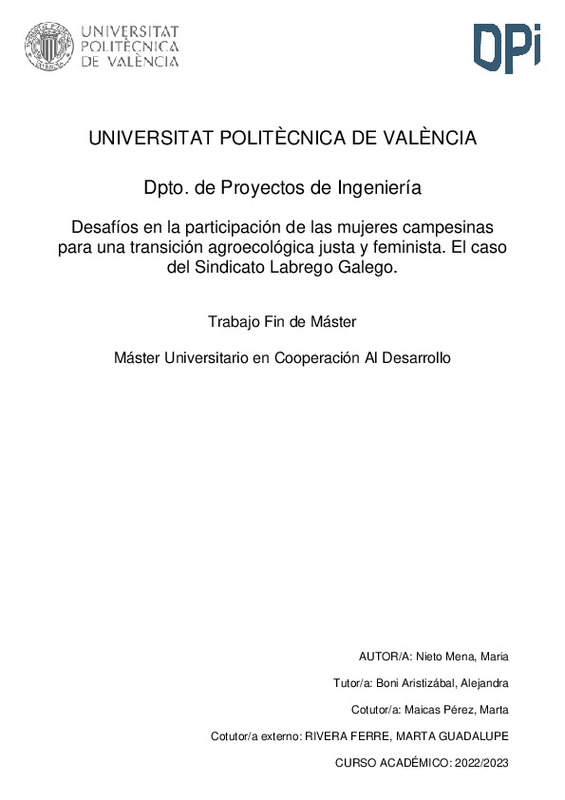|
Resumen:
|
[ES] Uno de los retos actuales de la transición agroecológica consiste en romper con las barreras que dificultan la participación de las mujeres en los espacios organizacionales y en la toma de decisiones. Comprender cuáles ...[+]
[ES] Uno de los retos actuales de la transición agroecológica consiste en romper con las barreras que dificultan la participación de las mujeres en los espacios organizacionales y en la toma de decisiones. Comprender cuáles son estos factores y proponer medidas para fomentar la igualdad y la reducción de las estructuras de poder en estos espacios constituye un elemento clave a la hora de crear una transición ecológica justa y feminista.
El proyecto SWIFT (Supporting Women-Led Innovation in Farming Territories) tiene como objetivo general fomentar las transiciones hacia un desarrollo sostenible e inclusivo a través del apoyo de innovaciones agroecológicas lideradas por mujeres. Dentro de este proyecto se encaja este estudio, donde coopera el Sindicato Labrego Galego (SLG). Este constituye uno de los referentes actuales en la lucha por la transición a una agricultura sostenible, justa y feminista. En los últimos años ha impulsado diferentes medidas que buscan fomentar la igualdad, tanto en un contexto amplio a nivel agrario como de forma interna dentro de su estructura organizacional. Dentro de estas iniciativas, destacan la inclusión de cuotas de representación paritarias en los órganos del SLG, así como la creación de la Secretaria das Mulleres, que tiene como principal objetivo promover todas las iniciativas necesarias para la defensa de los derechos de las mujeres campesinas. Conocer cómo estos cambios, junto con los demás factores contextuales y personales, influyen en la participación de las mujeres en estos espacios, nos permitirá comprender de una forma más profunda y holística cuáles son los desafíos actuales a la hora de transitar hacia un modelo agroecológico justo y feminista.
La falta de tiempo y el reparto desigual de las responsabilidades de cuidados constituyen dos de los elementos claves a la hora de explicar por qué los hombres participan más que las mujeres en estos espacios, por lo que este trabajo pretende profundizar más en las implicaciones que esto supone y generar recomendaciones para que el proyecto SWIFT y el SLG se enfrenten a estos desafíos.
[-]
[EN] One of the current challenges of the agroecological transition is to break down the barriers to women's participation in organisational spaces and decision-making. Understanding these factors and proposing measures ...[+]
[EN] One of the current challenges of the agroecological transition is to break down the barriers to women's participation in organisational spaces and decision-making. Understanding these factors and proposing measures to promote equality and the reduction of power structures in these spaces is a key element in creating a just and feminist ecological transition.
The SWIFT project (Supporting Women-Led Innovation in Farming Territories) has the overall objective of fostering transitions towards sustainable and inclusive development through the support of women-led agro-ecological innovations. This study, in which the Sindicato Labrego Galego (SLG) cooperates, is part of this project. The SLG is one of the current leaders in the struggle for the transition to sustainable, fair and feminist agriculture. In recent years it has promoted different measures aimed at promoting equality, both in a broad agricultural context and internally within its organisational structure. Among these initiatives, the inclusion of equal representation quotas in the bodies of the SLG stands out, as well as the creation of the Secretaria das Mulleres, whose main objective is to promote all the necessary initiatives for the defence of the rights of rural women. Understanding how these changes, together with other contextual and personal factors, influence women's participation in these spaces will allow us to understand in a deeper and more holistic way what the current challenges are in moving towards a fair and feminist agroecological model.
Lack of time and the unequal sharing of care responsibilities are two of the key elements in explaining why men participate more than women in these spaces, so this paper aims to further explore the implications of this and to generate recommendations for the SWIFT project and the SLG to address these challenges.
[-]
|








